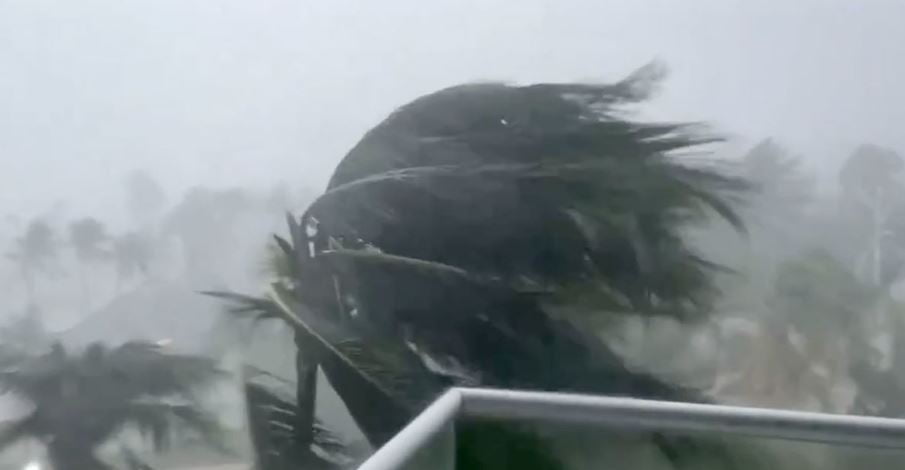The Initial Impact
As Hurricane Beryl—the first hurricane of the season—swept across the Caribbean, it unleashed unprecedented destruction, transforming tranquil island landscapes into scenes of desolation. This formidable Category 5 hurricane, the earliest to reach such intensity in recorded history, inflicted severe damage on Jamaica and several islands in the eastern Caribbean.
In the wake of the storm, leaders are grappling with the staggering financial toll. Prime Minister Dickon Mitchell of Grenada expressed the gravity of the situation, stating, “There is no doubt this disaster will have a major impact on Grenada’s economic situation. We are talking hundreds of millions of dollars in losses and hundreds of millions of dollars to rebuild.” The islands of Carriacou and Petite Martinique, in particular, face near-total devastation.
Vulnerability and Reconstruction
The hurricane’s aftermath has left many residents homeless and exposed to the elements. Mitchell highlighted the urgent need for rebuilding efforts that prioritize storm-resistant structures. This necessity is underscored by the increasing frequency of severe weather events, which scientists attribute to climate change driven by fossil fuel emissions.
The Prime Minister pointed out that many of Grenada’s wooden homes are uninsured, further exacerbating the vulnerability of affected populations. As the island nation braces for the arrival of a team of insurers, the government is preparing to implement fiscal measures aimed at addressing the extensive damage.
Widespread Economic Consequences
The economic ramifications of Hurricane Beryl are reverberating across the Caribbean. St. Lucia, for instance, reported early damage estimates of nearly $2 million, encompassing buildings, sea moss harvests, and banana plantations. Jamaica’s agriculture sector, which initially reported over $6 million in damages, faces significant challenges as rainfall and debris hinder damage assessments.
CARICOM chair Mohammed Ali described the destruction of long-term crops as “heart-breaking,” emphasizing that farmers will face ongoing difficulties for years to come. This agricultural devastation threatens to increase reliance on imported goods, further straining debt-ridden Caribbean economies.
Climate Change and Economic Vulnerability
The Caribbean region, despite contributing minimally to global emissions, is acutely vulnerable to climate change. The warming of ocean temperatures, driven by climate change, is linked to the increasing frequency and intensity of severe storms. Caribbean nations have long called for greater action from major polluting countries, urging them to honor their climate pledges and consider debt relief for affected nations.
However, climate-related financing and loans often funnel resources back to wealthy countries, leaving Caribbean nations struggling to cope with the economic fallout of climate disasters. The disparity between those responsible for emissions and those bearing the brunt of climate impacts underscores the urgent need for equitable climate action.
Rebuilding for Resilience
In the face of such overwhelming challenges, Caribbean leaders are emphasizing the importance of building resilience. Reconstructing infrastructure to withstand future storms is a crucial step in mitigating the impact of climate change. This includes not only physical structures but also economic systems that can better withstand and recover from such shocks.
The arrival of insurers and the implementation of government measures are pivotal in the initial recovery phase. However, long-term strategies must also focus on sustainable development practices that reduce vulnerability and enhance resilience to future climate events.
The Human Cost
Beyond the economic and structural damage, the human cost of Hurricane Beryl is profound. Thousands of individuals and families have been displaced, their homes and livelihoods destroyed. The psychological toll of such devastation cannot be understated, as communities grapple with the loss and uncertainty of rebuilding their lives.
Efforts to provide immediate relief and support for those affected are underway, with humanitarian organizations and government agencies mobilizing resources. Ensuring that these efforts are effective and reach the most vulnerable populations is critical in the short-term recovery process.
A Call for Global Action
The plight of Caribbean nations in the face of climate change serves as a stark reminder of the urgent need for global action. Wealthy nations, which have historically contributed the most to global emissions, have a responsibility to support those disproportionately affected by climate impacts. This includes not only financial support but also technological and infrastructural assistance to build resilience.
Honoring climate pledges, providing debt relief, and facilitating equitable access to climate financing are essential steps in addressing the global climate crisis. As the Caribbean braces for more frequent and intense storms, the international community must step up its efforts to support vulnerable regions and mitigate the impacts of climate change.
Conclusion
Hurricane Beryl’s devastating impact on the Caribbean is a harrowing example of the profound challenges posed by climate change. The economic, structural, and human costs of such events underscore the need for comprehensive and equitable climate action. As the region embarks on the arduous journey of recovery and rebuilding, the importance of resilience and global solidarity cannot be overstated. By addressing the root causes of climate change and supporting affected communities, we can strive toward a more sustainable and equitable future for all.
Soumya Smruti Sahoo is a seasoned journalist with extensive experience in both international and Indian news writing. With a sharp analytical mind and a dedication to uncovering the truth, Soumya has built a reputation for delivering in-depth, well-researched articles that provide readers with a clear understanding of complex global and domestic issues. Her work reflects a deep commitment to journalistic integrity, making her a trusted source for accurate and insightful news coverage.



